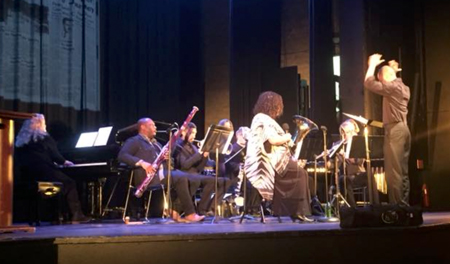20th Annual Twin Cities Jazz Festival
The 20th annual Twin Cities Jazz Festival began Thursday, June 21st and ended Saturday June 23rd. I can definitely say that “I got my money’s worth” out of this free annual festival. *smile*
Thursday
I get up (very) early to go talk about the festival and sing two of my original songs on TV. (You can watch the full segment here.)
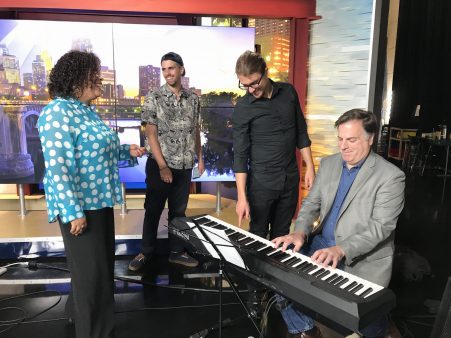
w/ Giulio Xavier (bass), Javi Santiago (piano) and Steve Heckler (Festival Director)
I also launched the video for “Awake” — one of the songs from my upcoming album – that morning.
That night, I go to my last night with the kids at the ComMUSICation Sforzando studio camp — a weeklong camp during which we assisted middle school students in writing, rehearsing and recording original songs.
Friday – My Solo Show!
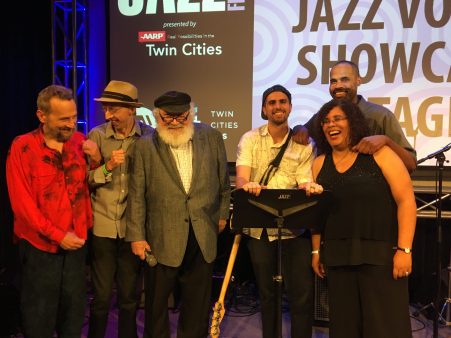
With the band and Davis, Jazzfest 2018. L to R: Dean Magraw, Steven Hobert, Davis Wilson, Giulio Xavier, Nathan Greer and me
The road to a show isn’t always smooth and that proved to be the case with my CD preview show. The Saturday before the festival, my bass player for the show, Jax — an international student from Madagascar — contacts me to tell me that because of the McSmithly closure, his international student status and the current changes in the enforcement of US immigration policies, he needs to leave for home — immediately. He won’t be able to play the show.
Fortunately, Dean Magraw has already agreed the day before to join us for the evening so I have piano, guitar and drums, but … I still really want a(n electric) bass player. I reach out to a few folks, but it is Jazzfest — folks are working.
Then Javi Santiago (piano) who has agreed to join me for the TV appearance Thursday am asks if his bass player Giulio Xavier can join us for the appearance. We get to chatting and I learn that Giulio is available and interested in playing my show Friday night. (Yay!)
Early Friday evening, my brother arrives. We eat a quick meal and head to the venue. My dad and his wife and many of my friends are there. (Thanks, friends!)
And in the front row are all the kids from camp. (They’ve ended their week-long camp with a field trip to see my show. *smile*)
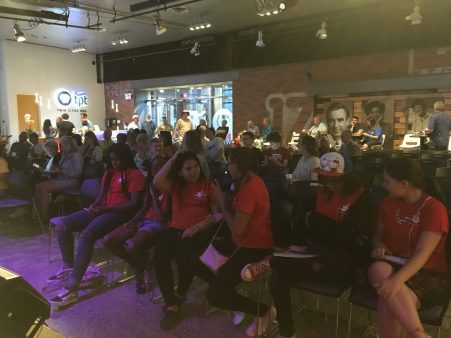
We get on stage and it’s so much fun! About half the songs we play are from the album and the others are simply songs I like. By the end of the set the audience is up and dancing.
We leave the stage to make room for Nancy Harms who does a beautiful set with local musicians (including Javi from my TV appearance Thursday am).
Then it is time for the Scat Off.
Maryann Sullivan, Katia Cardenas and I conceived of this event for the 2016 jazzfest and I am so happy we were invited to return in 2017 and again this year. A personal highlight for this year was that Sistet singer Mankwe Ndosi joined us. Once I learned that Mankwe had never(?!) sung at the TC Jazzfest, I invited her to join our Scat Off adventure. No surprise, she tore it up. We sang and laughed and played until it was time for the stage to close.
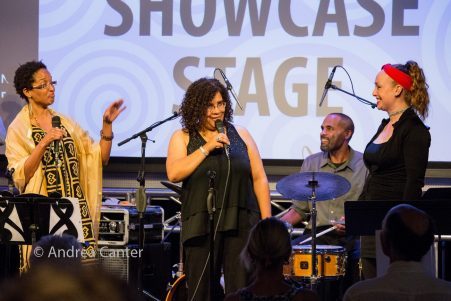
Saturday
Honestly? I had not planned to attend jazzfest on Saturday. *grins*
I’d had a tremendously busy week teaching summer school, teaching camp, getting the materials for my CD ready for the manufacturer, and singing two shows Friday night. But … I left my table at the TPT stage.
And I never picked up my check.
I knew (from past experience *sticks out tongue*) it would be easiest to pick it up both while the festival still going. And if I was going to go out, I should probably get myself to the FREE clinic with Dee Dee Bridgewater at Macphail. (I mean, it is Dee Dee Bridgewater and it is free.)
So after my family departed, I cleaned up and drove downtown for the clinic.
…
A friend asked me how the clinic with Dee Dee Bridgewater was.
In a word? Real.
Ms. Bridgewater began by talking about how she travels with Daisy, a shiatsu she calls her emotional support service animal. She regularly travels with Daisy and so Steve Heckler had made accommodations with the hotel for Daisy and her, but some young thing at the desk didn’t know that and threw her all kinds of attitude. (Now Ms. Bridgewater never says it because she’s some “old black lady with the dog,” but …)
She told us that story and said, “Then I have to come here and speak with all of you …” As a black woman in the music industry, I so appreciated her candor about the “stuff” she still encounters as well-known performer.
She talked to us about singing, vocal health and touring, and answered our questions. Then she asked if anyone wanted to sing. Um … yeah! (The lovely Laura Caviani was there to accompany. *smile*) Three of us sang for her and she gave notes and compliments! *smile and then it was time to end.
Afterwords, I thanked her and asked if we could take a picture. (She graciously said yes.)
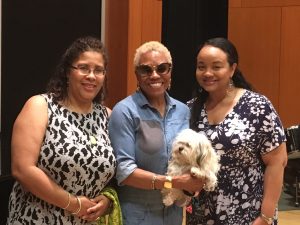
with my new friends, Dee Dee Bridgewater and Helena.
…
Next, I headed over to Lowertown. I knew parking would be an issue and after circling the TPT building a couple of times, I finally decided to pay the event parking fee and use the TPT ramp.
I found my table easily, but was unable to pick up the check I’d left behind the night before. The venue had very responsibly returned it to Steve, which meant that I would have to try to find him at the festival. (Piece of cake!)
As I was contemplating where and how I might find Steve, I realized Debbie Duncan’s set was starting soon. Debbie is a mentor and friend, so I went over to say hello. We got to visit a little before she had to go sing. Her set was great, especially her version of “The Way You Make Me Feel” with only voice, bass and drums (featuring Jay Young and Nathan Norman playing the swankiest, sassiest, most laid back groove I have ever heard). After her set, I headed to the park to see if I could track down Steve.
It likely goes without saying that Steve is a stupidly busy man on festival days. Once I found him, he told me to take a seat and he’d go grab my check. I met some of the festival volunteers and set up my stool and found a bottle of water. Then Steve asked me to wait for Nayo Jones to finish playing and then he’d go get the check. But he got caught up in waiting for Dee Dee to go on so I got to hang in the pre-stage area with St. Paul’s new mayor Melvin Carter (he was so excited, I wish I had a picture *smile*), Nayo Jones and Ginger Commodore. We all danced with Dee Dee Bridgewater before she went on stage.
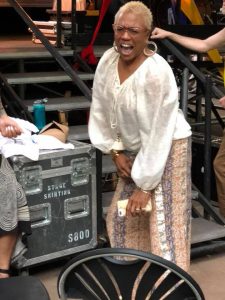
I stayed for Dee Dee’s set (duh), then walked with Debbie Duncan back toward the ramp. We each were kind of wondering what to do next – check out some of the indoor events (the outdoor music ends at 10pm) or head home? We both made noises about begin tired and parted ways. I got in my car at the ramp and was about to leave when I realized that Solomon Parham’s jam session was less than a block away. I charged my phone for a few minutes and then left my car in the ramp and walked over to Hygge (pronounced hue-guh and former home of Bedlam Lowertown). I stayed for about an hour and got to meet some of my facebook musicians friends in real life and listen to the lovely Aja Parham sing. When they took their break, I headed out.
At this point, it is clear that I am in it for the long haul. I mean I have been now been festival-ing for the past 7 or 8 hours. So I leave the TPT ramp and head over to Vieux Carré to catch the end of Jon Weber’s jazz jam. I walk in and who is there? … Ms. Debbie Duncan. We laugh about how neither of us was ready to go home. While we are there Nayo Jones and her band come in. I met her very briefly in the pre-stage area and she comes over and gives hugs to Debbie and me and then finds a seat with her father and band.
Debbie tells me to go over and tell Nayo she should sing something. So I find her at her table and tell her “Ms Debbie says you should sing something.” Nayo replies that “no one has invited her to sing.” I laughed and said that no one (except me?) would want to make her uncomfortable by asking. (I also make a point of saying that if she is done singing for the night that is totally fine. *smile*)
Shortly after Nayo gets up and sings the liveliest, killin’-est salsa version of “If I Only Had a Brain” with her band. She and her father dance during the instrumental breaks. Her band stayed up for a few more tunes, including a Latin-inspired Summertime with Jimmie-apolis. Tabla player Krissy Bergmark also took to the stage … er … floor for a couple of tunes.
Debbie and I joined her on a swingin’ version of “Blue Skies.”
Krissy Bergmark laying it down with the Jon Weber trio at the jazz jam. (Krissy I did blue skies with Debbie Duncan Jazz a little later.) #jazzwomen #jazzfest
Posted by Sarah M. Greer Music on Sunday, June 24, 2018
Whew! And to think I wasn’t even going to leave the house. *wink*
—
Sarah M. Greer is a fiscal year 2017 recipient of an Artist Initiative grant from the Minnesota State Arts Board. This activity is made possible by the voters of Minnesota through a grant from the Minnesota State Arts Board, thanks to a legislative appropriation by the Minnesota State Legislature; and by a grant from the National Endowment for the Arts.

![]()
